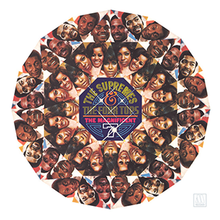| The Magnificent 7 | ||||
|---|---|---|---|---|
 | ||||
| Studio album by | ||||
| Released | September 1970 | |||
| Recorded | 1970 | |||
| Genre | Soul, R&B | |||
| Label | Motown | |||
| Producer | Frank Wilson, Duke Browner, Clay McMurray, Nickolas Ashford & Valerie Simpson | |||
| The Supremes chronology | ||||
| ||||
| The Four Tops chronology | ||||
| ||||
| Singles from The Magnificent 7 | ||||
| ||||
The Magnificent 7 is a collaborative album combining Motown's premier vocal groups, the Supremes and the Four Tops. Issued by Motown in 1970, it followed two collaborative albums the Supremes did with the Temptations in the late 1960s. The album featured their hit cover of Ike & Tina Turner's "River Deep – Mountain High", which reached number 14 on the US Billboard Hot 100 singles chart. In the UK, the album peaked at number 6.[1] In December 1971, Billboard reported UK album sales of 30,000 copies.[2]
Apart from "Knock on My Door" (written by Patti Jerome and Joe Hinton), the tracks on the LP are covers of rock and soul songs, including the duet by Dinah Washington and Brook Benton "Baby (You've Got What It Takes)", Bobby Scott's "A Taste of Honey", Sly & the Family Stone's "Everyday People", Ed Townsend's "For Your Love" and Laura Nyro's "Stoned Soul Picnic", as well as hits by other Motown artists: the Tops' own "Without the One You Love (Life's Not Worth While)", the duet "Ain't Nothing Like the Real Thing" by Marvin Gaye and Tammi Terrell, Gaye's and Kim Weston's "It's Got to Be a Miracle (This Thing Called Love)", The Spinners' "Together We Can Make Such Sweet Music" and former Supremes' bandmate Diana Ross' 1970 debut solo single, "Reach Out and Touch (Somebody's Hand)".
"River Deep – Mountain High" was released as a single in the Netherlands, with "Knock on My Door" on the flip side. Two more singles were issued in the United Kingdom in 1972: "Without the One You Love" with "Let's Make Love Now" on the B side; and "Reach Out and Touch (Somebody's Hand)" backed by "Where Would I Be Without You, Baby". As was the case with the previous pairing of Diana Ross & the Supremes with the Temptations, Motown appeared to feel that group names alone would insure heavy sales and little attention was paid to content, thus the absence of original material. The album sold poorly in the USA but did better in Europe.
- ^ Cite error: The named reference
UKwas invoked but never defined (see the help page). - ^ Phillips, Paul (December 25, 1971). "U.K. Motown in Biggest Ever Year". Billboard. p. 46. Retrieved 1 January 2020 – via Google Books.